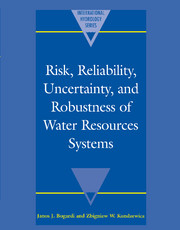Book contents
- Frontmatter
- Contents
- List of Contributors
- 1 Introduction
- 2 Integrated regional risk assessment and safety management: Challenge from Agenda 21
- 3 Risk analysis: The unbearable cleverness of bluffing
- 4 Aspects of uncertainty, reliability, and risk in flood forecasting systems incorporating weather radar
- 5 Probabilistic hydrometeorological forecasting
- 6 Flood risk management: Risk cartography for objective negotiations
- 7 Responses to the variability and increasing uncertainty of climate in Australia
- 8 Developing an indicator of a community's disaster risk awareness
- 9 Determination of capture zones of wells by Monte Carlo simulation
- 10 Controlling three levels of uncertainties for ecological risk models
- 11 Stochastic precipitation-runoff modeling for water yield from a semi-arid forested watershed
- 12 Regional assessment of the impact of climate change on the yield of water supply systems
- 13 Hydrological risk under nonstationary conditions changing hydroclimatological input
- 14 Fuzzy compromise approach to water resources systems planning under uncertainty
- 15 System and component uncertainties in water resources
- 16 Managing water quality under uncertainty: Application of a new stochastic branch and bound method
- 17 Uncertainty in risk analysis of water resources systems under climate change
- 18 Risk and reliability in water resources management: Theory and practice
- 19 Quantifying system sustainability using multiple risk criteria
- 20 Irreversibility and sustainability in water resources systems
- 21 Future of reservoirs and their management criteria
- 22 Performance criteria for multiunit reservoir operation and water allocation problems
- 23 Risk management for hydraulic systems under hydrological loads
12 - Regional assessment of the impact of climate change on the yield of water supply systems
Published online by Cambridge University Press: 18 January 2010
- Frontmatter
- Contents
- List of Contributors
- 1 Introduction
- 2 Integrated regional risk assessment and safety management: Challenge from Agenda 21
- 3 Risk analysis: The unbearable cleverness of bluffing
- 4 Aspects of uncertainty, reliability, and risk in flood forecasting systems incorporating weather radar
- 5 Probabilistic hydrometeorological forecasting
- 6 Flood risk management: Risk cartography for objective negotiations
- 7 Responses to the variability and increasing uncertainty of climate in Australia
- 8 Developing an indicator of a community's disaster risk awareness
- 9 Determination of capture zones of wells by Monte Carlo simulation
- 10 Controlling three levels of uncertainties for ecological risk models
- 11 Stochastic precipitation-runoff modeling for water yield from a semi-arid forested watershed
- 12 Regional assessment of the impact of climate change on the yield of water supply systems
- 13 Hydrological risk under nonstationary conditions changing hydroclimatological input
- 14 Fuzzy compromise approach to water resources systems planning under uncertainty
- 15 System and component uncertainties in water resources
- 16 Managing water quality under uncertainty: Application of a new stochastic branch and bound method
- 17 Uncertainty in risk analysis of water resources systems under climate change
- 18 Risk and reliability in water resources management: Theory and practice
- 19 Quantifying system sustainability using multiple risk criteria
- 20 Irreversibility and sustainability in water resources systems
- 21 Future of reservoirs and their management criteria
- 22 Performance criteria for multiunit reservoir operation and water allocation problems
- 23 Risk management for hydraulic systems under hydrological loads
Summary
ABSTRACT
Investigations of the impact of climate change on water resources systems usually involve detailed monthly hydrological, climatological, and reservoir systems models for a particular system. The conclusions derived from such studies only apply to the particular system under investigation. This study explores the potential for developing a regional hydroclimatological assessment model useful for determining the impact of changes in climate on the behavior of water supply systems over a broad geographic region. Computer experiments performed across the United States reveal that an annual streamflow model is adequate for regional assessments which seek to approximate the behavior of water supply systems. Using those results, a general methodology is introduced for evaluating the sensitivity of water supply systems to climate change in the northeastern United States. The methodology involves the development of a regional hydroclimatological model of annual streamflow which relates the first two moments of average annual streamflow to climate and drainage area at 166 gaging stations in the northeastern United States. The regional hydroclimatological streamflow model is then combined with analytic relationships among water supply system storage, reliability, resilience, and yield. The sensitivity of various water supply system performance indices such as yield, reliability, and resilience are derived as a function of climatical, hydrological, and storage conditions. These results allow us to approximate, in general, the sensitivity of water supply system behavior to changes in the climatological regime as well as to changes in the operation of water supply systems.
- Type
- Chapter
- Information
- Publisher: Cambridge University PressPrint publication year: 2002

